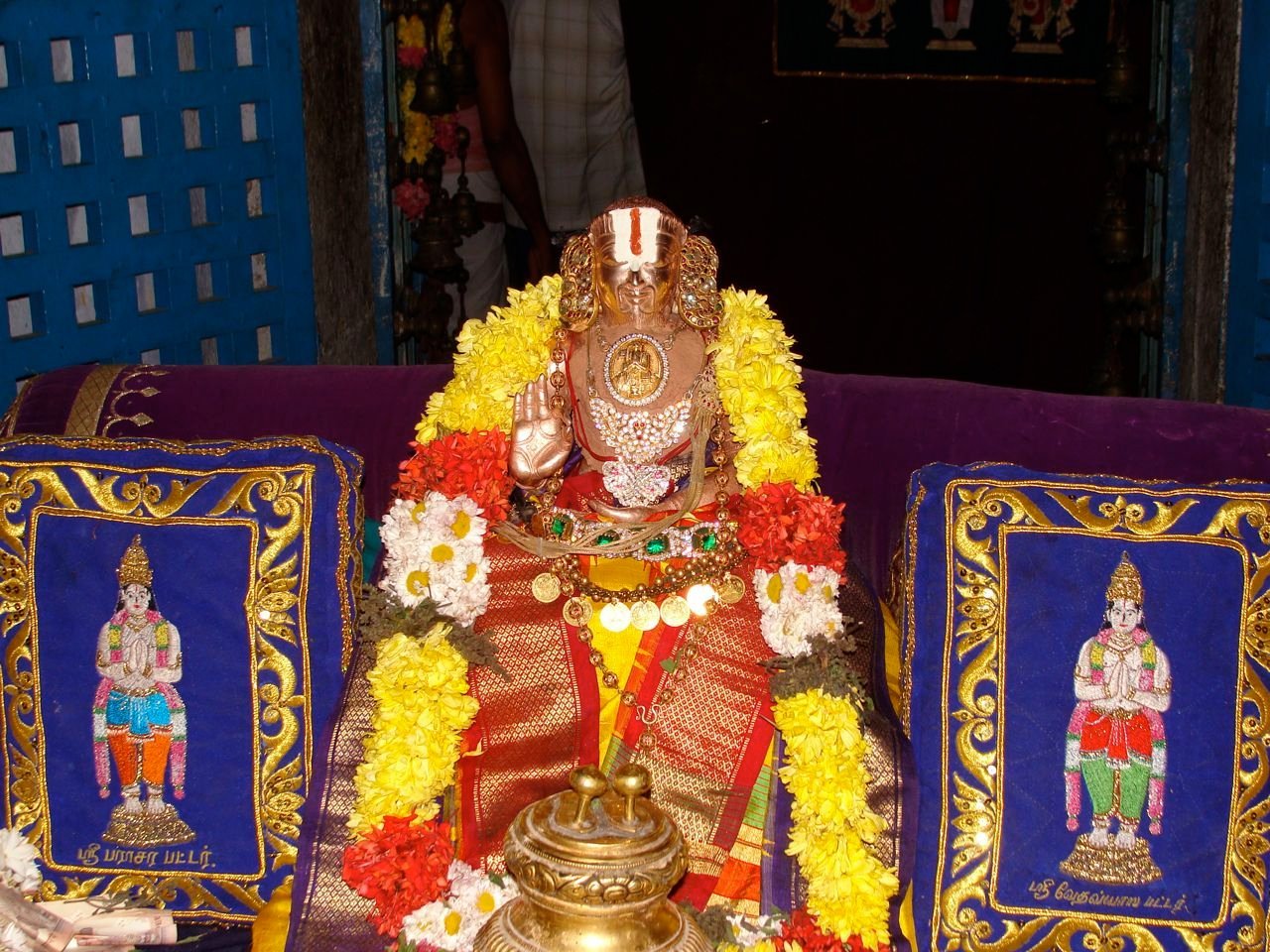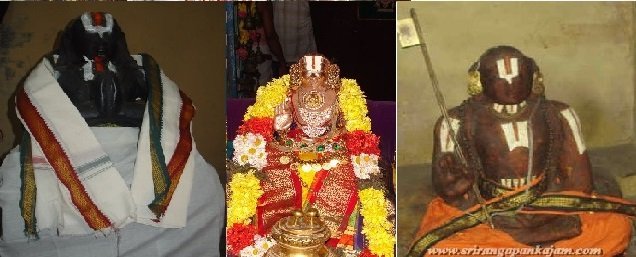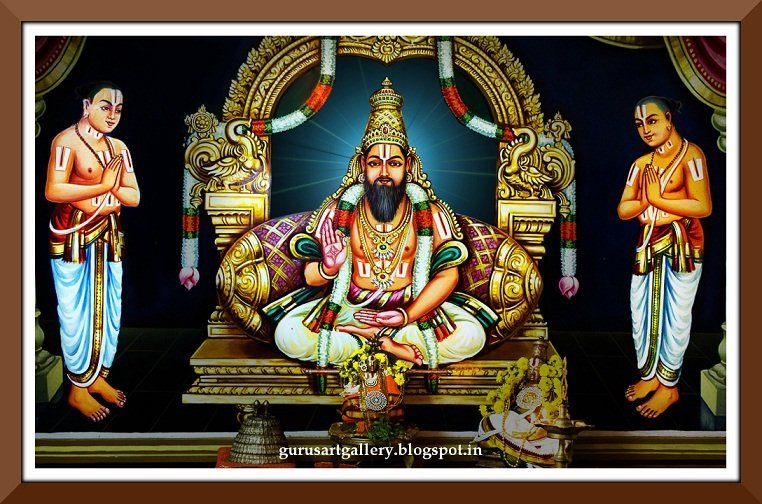 thirunakshathram: thai, hastham
thirunakshathram: thai, hastham
avathAra sthalam: kUram
AchAryan: emperumAnAr
Sishyas: thiruvarangathamudhanAr
Place where he attained paramapadham: srIrangam
Works: pancha sthavam (athi mAnusha sthavam, srI vaikunta sthavam, sundhara bhAhu sthavam, varadharAja sthavam, srI sthavam), yO nithyam achyutha/lakshminAtha thanians
- Born in kUram village in a noble family in the year 1010 CE (sowmya varusham, thai mAsam, hastha nakshathram) as the son of kUrathazhwar and perundhEvi ammAL. He was named srivathsAngan.
- His mother attained AchAryan thiruvadi (passed away) at a very young age and his father does not remarry even though sAsthrams insist one must be in a proper Asramam (i.e., once married, if the wife passes away, a man should remarry). His father says “if i get married and my new wife does not treat kUrathAzhwAn well, it will be a bhAgavatha apachAram”. Such is his qualities even at a very young age.
- He was guided by thirukkachi nambi who was serving dhEvaperumAL.
- He gets married to ANdAL who is equally great in good qualities.
- He takes shelter of emperumAnAr and accepts pancha samskAram from him.
- Leaving behind all his wealth at kUram, he along with his wife reach srIrangam and starts living there by taking unjavruthi (bikshai).
- He travels with emperumAnAr to Kashmir to retrieve Bodayana Vruthi Grantham. After losing the grantham on the way back, he comforts emperumAnAr that he memorized the whole grantham. Later, after getting back to srIrangam, he helps emperumAnAr complete his magnus opum “srI bhAshyam” by recording it in palm leaves as dictated by emperumAnAr.
 amudhanAr – AzhwAn – emperumAnAr
amudhanAr – AzhwAn – emperumAnAr
- He instructs thiruvarangathu amudhanAr regularly and gets him to become a disciple of emperumAnAr, give up the temple responsibilities and hands over the temple keys to emperumAnAr after sitting in the EkAgam ritual.
- He goes to the saiva king’s court in place of emperumAnAr, refutes the king’s claim of “rudhran being the supreme”, establishes of srIman nArAyaNa‘s supremacy and in the end gives up his own dharshanam (eyes) to protect srIvaishNava dharshanam (sampradayam).
- He leaves srIrangam to go to thirumAlirunchOlai (after emperumAnAr leaves to thirunArAyaNapuram/mElkOte) where he stays for 12 years.
- He sings sundhara bAhu sthavam (one of pancha sthavam sung by him) to kaLLazhagar (thirumAlirunchOlai emperumAn).
- He returns back to srIrangam after hearing about emperumAnAr‘s return to Sri Rangam.
- Under the instructions of emperumAnAr, he sings varadharAja sthavam to dhEva perumAL, and in the end asks for mOksham to all his sambhandhis – especially nAlurAn (who was one of the main causes for him losing his eyes).
- In total he sings pancha sthavams – srI vaikuntha sthavam, athimAnusha sthavam, sundhara bAhu sthavam, varadaraja sthavam and srI sthavam – all of them contains the juice of vedantha meanings.
- He gets assigned the pourANika kainkaryam in srIrangam temple by emperumAnAr and he also remains the grantha nirvAhi for our sampradayam during his times.
 AzhwAn and his sons parAsara bhattar and vEdha vyAsa bhattar
AzhwAn and his sons parAsara bhattar and vEdha vyAsa bhattar
- He and his wife ges the prasAdham from Sri Ranganathan, and from that prasAdham two beautiful children are born to them. They are named parAsara bhattar and vEdha Vyasa bhattar.
- He is so immersed in arulicheyal anubhavam (4000 divya prabhandham) that whenever he starts saying an upanyasam either he keeps crying after being overwhelmed by anubhavam or he faints.
- periya perumAL converses with him directly.
- Finally, he requests mOksham from periya perumAL and periya perumAL grants it. When emperumAnAr asks “how can you leave before me?”, he says “According to sUzh visumbaNi mugil… padhigam in ThiruvAimozhi, when one goes to paramapadam, nityas and muktas come and wash the feet of the newly arriving mukta atma. How can I allow you to come and do that for me? That is why I am leaving before you.”.
- There are numerous aidhIhyams (incidents) which are identfied/elaborated in vyAkyAnams (commentaries) and guru parampara prabhAvam relating to kUrathAzhwAn.
- Is it possible to list out the greatness of kUrathAzhwAn in this single page? If it is not for my inability to comprehend kUrathAzhwAn’s vaibhavam, this page could be endless.
AzhwAn’s thanian
srIvathsa chinna misrEbyO nama ukthima dhImahE:
yadhukthayas thrayi gantE yaanthi mangaLa sUthradhAm:
ஸ்ரீவத்ஸ சிந்ந மிஸ்ரேப்யோ நம உக்திம தீமஹே:
யதுக்தயஸ் த்ரயி கண்டே யாந்தி மங்கள ஸூத்ரதாம்:
I worship kUrathAzhwAn, whose pancha sthavam are like mangala sutra (ThirumAngalyam) for the vedas – i.e., without which there is no clarity in who is paradhEvathai.
AzhwAn’s special greatness (based on srI U. vE. vELukkudi krishNan swamy’s lecture on this topic – written during AzhwAn’s 1000th year celebration at thiruvallikkENi – originally posted in http://koorathazhwan1000.webs.com/)
arvAnchO yath padha sarasija dhvandhvam Asrithya pUrvE
mUrdhnA yasyAnvayam upagathA desikA mukthimApu:
sOyam ramanuja munir api sveeya mukthim karastAm
yath sambhandhAdh amanutha katam varnayathe kUranatha:
How can we speak the greatness of kUrathAzhwAn within the boundary of words (mozhiai kadakkum perumpugalAn/vAcha magOchara)? Everyone gets mOksham through emperumAnAr – some (who are elders to emperumAnAr) through his thirumudi sambhandham and others (who are younger to emperumAnAr) gets through his thiruvadi sambhandam. Such great personality emperumAnAr himself proclaims that it was due to his connection to kUrathAzhwAn he gets mOksham.
kUrathAzhwAn is one of the prime disciples of emperumAnAr. Born in kUram village near Kanchipuram in a noble family, kUrathAzhwAn is considered as an epitome of Srivaishnava Acharyas. He was well known for not having 3 mathams – prides (vidya matham – proud of having high knowledge, dhana matham – proud of having huge wealth, abijathya matham – proud of having born in noble family). He was praised by thiruvarangathu amudhanAr in rAmAnusa nURRanthAdhi as “mozhiyai kadakkum perum pugazhAn vanja muk kurumbAm kuzhiyai kadakum nam kUrathAzhwAn” and by Manavala MAmunigal in Yathiraja Vimsadhi as “vAchAmagocara mahAguna desikAgrya KUrAdhinatha” – both indicating that kUrathAzhwAn’s vaibhavams are beyond words. In fact both rAmAnusa nURRanthAdhi and yathirAja vimsathi are aimed at praising emperumAnAr.
emperumAnAr is considered as the most important acharya in Srivaishnava sampradayam. This sampradayam truly represents Sanatana Dharma (vedic religion) which contains boundless knowledge about tattva trayam (chit – soul, achit – matter and Iswara – God srIman nArAyaNan). emperumAnAr preached this universal dharma all over India. He was a visionary who played many roles – preacher, temple administrator, social reformist, humanitarian, etc. He wrote nine granthams explaining various aspects of vEdham, vEdhAntham, bhagavath gIthA, concept of saranagati (complete surrender to god) and vaidhIka anushtAnams.
emperumAnAr is closely related to Sri Parthasarathy swamy temple. It was because of his father’s prayers to Sri VenkataKrishnan/Sri Parthasarathy, presiding deity here in Thiruvallikeni, emperumAnAr was born into this world.. It is one of the 108 divya desams where pEyAzhwAr, thirumazhisai AzhwAr and thirumangai AzhwAr have performed mangaLAsAsanams.
gIthAcharyan and Azhwan 1
Sri Parthasarathy, who is gIthAchAryan – one who spoke srI bhagavath gIthA to arjunan. Sri bhagavath githA is considered as the most important scripture for Sanatana Dharma and especially Srivaishnavas as this is directly spoken by krishNa himself.
In the 13th AdhyAyam (Chapter) of Sri bhagavath githA, krishNa explains the difference between Kshetra (body) and Kshetranja (Knower of the body – soul). As part of his instructions, he explains the 20 important qualities of a God realized person. These qualities are wonderfully visible in kUrathAzhwAn’s life and we will walk through each of the qualities explained by kaNNan emperumAn with specific examples from kUrathazwan’s life.
Sri bhagavath githA, Chapter 13, Slokas 7 – 11
amAnithvam adambhithvam
ahimsA shAnthir Arjavam
AcharyOpAsanam saucham
sthairyam Athma-vinigraha:
indhriyArthesu vairAgyam
anahankAra Eva cha
janma mrthyu jarA vyAdhi
duhkha dhOshAnudharsanam
ashakthir anabhisvangah
puthra dhAra grhAdisu
nithyam cha sAma chiththathvam
ishtAnishtopapaththisu
mayi chAnanya yOgEna
bhakthir avyabhichAriNi
viviktha dhEsa sEvithvam
Aratir jana samsadhi
adhyAthma gyAna nithyathvam
thaththva gyAanArtha dharshanam
Ethath gyAnAnam ithi prOktham
agyAnAnam yadh athO anyatha
1. amanitvam – humility
- Even though he was born in a noble and wealthy family, he gave up everything when he decided to go to srIrangam to server emperumAnAr.
- In srIrangam, there was a time, when emperumAnAr was asking Sri Periya Nambi to drop holy sand by circling around the temple to protect it from evils, Sri Periya Nambi asks for some one to accompany him – but insists that person should be very humble – one who will not think even for a moment that why should I walk behind another person. While emperumAnAr is thinking and looking around, Sri Periya Nambi himself says, “Please send KUrathanzhwan since there can be no one more humble than him”.
2. adambhitvam – pridelessness
- When accompanying Sri Ramanja to Kashmir to retrieve the Bodhayana vruthi grantham (which is a short commentary for Brahma sutras), they received the grantham and were returning back. At that time, some of the local pandits who did not like emperumAnAr sent some soldiers who took the grantham away from emperumAnAr. While emperumAnAr was in shock and disappointment, kUrathAzhwAn mentions to emperumAnAr that he memorized the whole grantham in night time after serving him. But still he did not show even a tinge of pride during this incident.
3. ahimsa – nonviolence
- Once he hears the sound of a frog crying out while being eaten by a snake. He starts crying for the poor frog and faints immediately. This shows his love for all living beings. He is considered as an incarnation of Sri Rama, who as stated in Valmiki Ramayanam, when some thing bad happens in Ayodhya before the affected person Sri Rama cries and when some thing good happens he feels happy before the affected person.
4. ksantir – tolerance
- emperumAnAr learns the meanings of Sri bhagavath githA Charama slokam (Sarva DharmAn Parithyajya mAm ekam …) from Sri Thirukottiyur Nambi. Sri Thirukotiyur Nambi instructs emperumAnAr to teach this only to his disciples after putting them through difficult tests. When, kUrathAzhwAn asks for the meanings, emperumAnAr asks him to show his dedication, and kUrathAzhwAn, fasts for 1 month outside the mutt of emperumAnAr. Finally he learns it after being patient for so long.
- He also forgives and begs for Moksham for NAlurAn who was one of the cause for losing his eyes in the Saiva king’s palace.
5. arjavam – honesty
- After instructing thiruvarangathu amudhanAr for a while on bhagavath vishayam, when amudhanAr wanted to become a disciple, he asked him to take shelter of emperumAnAr.
- After instructing Pillai Pillai Azhwan, kUrathAzhwAn tells him to always depend on emperumAnAr.
6. acarya-upasanam – always depending on the Acharya
- When emperumAnAr places his feet on a deaf and dumb person who is living in Sri Rangam, kUrathAzhwAn starts crying and says there is no use of learning vedanthams compared to getting the lotus feet of emperumAnAr. “thruNi krutha virinchAdhi nirangusa vibUthaya: rAmAnuja padhAmbOja samAsrayaNa sAlina:” indicates the same meaning.
7. saucam – cleanliness -both internal and external
- While it is obvious that such great personality will be externally clean, the next examples show how clean his heart was.
- When emperumAnAr had to leave srIrangam to go to Melkote due to Saiva King’s actions, kUrathAzhwAn was still living in srIrangam. One day, when he entered the temple, one of the guards stopped him saying “the king has ordered anyone related to emperumAnAr should not enter the temple”. But another guard at that time said, ” kUrathAzhwAn is a person of great qualities, so we should let him in”. Hearing this kUrathAzhwAn said, “If I have any good qualities, that is because of my relationship with emperumAnAr” and leaves the temple without entering. Such is his pure heart, that if some one considers him independently great, he does not accept it, even to take the Darshan of the Lord Sri Ranganatha.
8. sthairyam–steadfastness
- When some devotees was asking “why srivaishnavas are not worshipping dhEvatantarams?”, kUrathAzhwAn said because our elders (pUrvacharyas – great vedic scholars) did not do that, we are also not doing it. He had such steady mind and faith on pUrvacharyas.
9. atma-vinigrahah – self control (vairaghyam)
- When his children were getting ready to be married, his wife and many others were asking him to look for suitable brides. kUrathAzhwAn said “Iswara kudumbathukku nAm yAr karaivathu?” – meaning “Why should I worry for Bhagavan’s family? It is srI ranganAtha’s responsibility.”.
- When emperumAnAr instructs kUrathAzhwAn to sing kAnchipuram dhEvaperumAL and request for his eyes back – kUrathAzhwAn asks for Moksham for him and NAlurAn who caused the loss of eyes.
10. indriya-arthesu vairagyam -renunciation in the matter of the senses
- When Thiruvarangathu amudhanAr submits all his wealth (gold, etc) to kUrathAzhwAn, kUrathAzhwAn simplity throws them out on the street, and tells emperumAnAr that he got rid of unnecessary burdens.
11. anahankAra – being without false egoism
- Even after being a great scholar, wealthy person, etc., when emperumAnAr gets upset with kUrathAzhwAn while writing the Sri Bhashya, kUrathAzhwAn says, “emperumAnAr is my Swamy and I am his Dasan, so he can do whatever he wants to me”.
12. janma-mrtyu-jara-vyadhi-
duhkha-dosanudarsanam – Always seeing the faults in this samsara
- Once when he hears some one gives birth to a child, kUrathAzhwAn goes in front of Lord Ranganatha and cries. When asked why, he says “When some one gets put in this jail of samsara, you have to go and cry in front of the one who can relieve them from this samsara. Since Lord Ranganatha is the only one who can liberate us all from samsara, I went and cried in front of him for this new born child”.
13. asaktir – detachment
- When travelling to srIrangam to take shelter of emperumAnAr, through the forest, kUrathAzhwAn’s wife was looking worried. When asked she said she was carrying the gold vessel in which kUrathAzhwAn will eat prasAdham every day. Hearing this, he takes that from her and threw it away, saying what is the use of this utensil when Lord Ranganatha and Sri Ramanuja are there. This shows that he did not even have a tinge of attachment to anything material.
14. putra, dara, grha-adisu anabhisvangah – without association to sons, wife, home, etc.
- Not only he gave up all his wealth, he also started taking unja vruthi (bikshai) for his daily needs after reaching srIrangam. Even after having a family, he was very strict in adhering to sastras.
- When he was instructing to his disciples on rahasya trayam (Thirumantram, dvayam, charama slokam), he first asks his children to leave – but later invites them and teaches them the inner meanings. When asked why, he says, “well who knows how long they could live, they could lose their life before reaching home, that is why I wanted to make sure they learn this”. This shows, he is not sentimental towards his children, but see them also as atmas who need to attain proper knowledge and get liberated from samsara
- It is also said that he did not keep any bodily relationship with his wife and his children (both Parasara bhattar and vedavyasa bhattar) were given by Lord Sri Ranganatha itself through his prasAdham.
15. ista anista upapattisu nityam sama-cittatvam – even-mindedness amid pleasant and unpleasant events
- When he lost his eyes kUrathAzhwAn did not worry too much. He said “what is the use of these eyes anymore after seeing the king who is a bhagavad virodhi”. When emperumAnAr instructs him to request his eyes back from Sri Kachi Varadan, kUrathAzhwAn is not too happy either – he says “I am already seeing both emperumAnAr and emperumAn through my inner eyes, so what is the need for these external eyes?”.
16. mayi ananya-yogena bhaktih avyabhicarini – constant devotion unto me (krishNa) only
- Even in many adverse conditions, such as having to lose his eyes, or having to leave srIrangam, etc., kUrathAzhwAn always prayed for constant devotion to emperumAn. He never went to any one else, nor he asked anything other than complete devotion to the Lord.
17. vivikta desa sevitvam – living in solitary places
- For a Srivaishnava, living in a solitary place means living in holy places where there is activities around Lord only nothing else. kUrathAzhwAn always stayed with his Acharya emperumAnAr and was always thinking about service to emperumAnAr and emperumAn.
18. aratih jana samsadi – without attachment to people in general
- Even though great devotees may have to associate with general people, they will still show no attachment towards them. kUrathAzhwAn even though had to associate with ordinary people (kings, etc) who takes instructions from him, but never showed any attachment towards them.
19. adhyatma jnana nityatvam – pertaining to the eternal self knowledge
- Right from the young age, kUrathAzhwAn always shows interest in self knowledge and shows clear understanding of all jivatmas are servants of paramatma.
20. tattva-jnana artha chintanam – Thinking about the true knowledge
- kUrathAzhwAn always was thinking about the true knowldge – that all jivatmas are servants of Sriman Narayana. That is why when he left his body to go to paramapadham, emperumAnAr instructs the Srivaishnavas to keep reciting Dvaya maha mantram in kUrathAzhwAn’s ears since that is what he is always thinking about.
Conclusion
It is so amazing to see all this wonderful qualities in a single person. That is why periyavAchAn pillai says “Both Acharya and Sishya lakshanam are fully manifested in KUrathazhawan” in mAnikkA mAlai. Let us atleast try to take some of these examples and implement it in our life – to please kUrathAzhwAn and all our pUrvacharyas.
Source: vyAkyAnams, 6000 padi guru paramparA prabhAvam
archived in https://acharyas.koyil.org/index.php/, also visit http://ponnadi.blogspot.com/, http://sriperumbuthur.blogspot.com
Swami, would You kindly let us know the meaning of ‘sarpa nEthrAmsa samBHavam’ phrase in Sri Koorathazhwan Thirunakshatram Thaniyan?
sarpanEthra is the name of a nithyasUri – Here AzhwAn is explained as an incarnation of him – this is explained by kOyil vidhvAn SrI u vE thiruppullANi sundhararAja iyengar swamy.
adiyen sarathy ramanuja dasan
Dhanyosmi Swami. adiyEn.
adiyEn. DhanyOsmi swAmi.